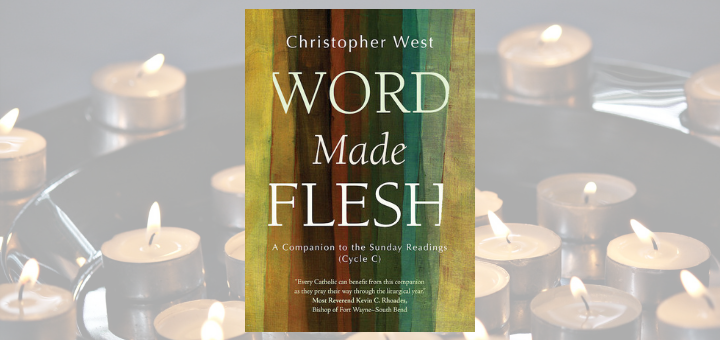
 Christopher West is well-known as an expert on St. Pope John Paul II’s teachings on the Theology of the Body. In Word Made Flesh (Ave Maria Press, 2018), he views the Sunday readings for the coming liturgical year (Cycle C) through the lens of that teaching.
In the Introduction, West states that “the astounding claim upon which all of Christianity rests is that the human body is God’s chosen vehicle for communicating the Word, for communicating ultimate meaning and for communicating who he is, who we are, and his final plan for the universe.” He maintains that we can “summarize all of sacred scripture with five simple yet astounding words: God wants to marry us.” God wants to be intimate with us in a way “akin to the intimacy of spouses in one flesh.”
Christopher West is well-known as an expert on St. Pope John Paul II’s teachings on the Theology of the Body. In Word Made Flesh (Ave Maria Press, 2018), he views the Sunday readings for the coming liturgical year (Cycle C) through the lens of that teaching.
In the Introduction, West states that “the astounding claim upon which all of Christianity rests is that the human body is God’s chosen vehicle for communicating the Word, for communicating ultimate meaning and for communicating who he is, who we are, and his final plan for the universe.” He maintains that we can “summarize all of sacred scripture with five simple yet astounding words: God wants to marry us.” God wants to be intimate with us in a way “akin to the intimacy of spouses in one flesh.”
 For each Sunday, West offers a short quote from one of the readings for the day. This is followed by a reflection and the list of reading citations for the day.
Viewing the Scriptures as the story of an intimate love affair may seem strange, but according to West, “the Bible uses marriage more than other image to help us understand divine love.” On the other side of the equation, we long for God whether we realize it or not. We often try to fill that desire with other earthly people and things, but we will never be fully satisfied until we are united with God. Through our prayer, we expose our longing for God.
Another point West makes is that our bodies are to be valued; they are not an afterthought. “The body is the specific vehicle of the spiritual life.” As St. John Paul II taught, “The body, in fact, and only the body, is capable of making visible what is invisible: the spiritual and the divine.” Christ did not come only to save our souls, “but to save human persons who are always, by divine design, a marriage of body and soul.”
Word Made Flesh offers a unique look at the Sunday readings for the coming year. If you are looking to have your traditional understanding of Scripture challenged, or if you wish to develop a better understanding of St. John Paul II’s Theology of the Body, this is the book for you.
For each Sunday, West offers a short quote from one of the readings for the day. This is followed by a reflection and the list of reading citations for the day.
Viewing the Scriptures as the story of an intimate love affair may seem strange, but according to West, “the Bible uses marriage more than other image to help us understand divine love.” On the other side of the equation, we long for God whether we realize it or not. We often try to fill that desire with other earthly people and things, but we will never be fully satisfied until we are united with God. Through our prayer, we expose our longing for God.
Another point West makes is that our bodies are to be valued; they are not an afterthought. “The body is the specific vehicle of the spiritual life.” As St. John Paul II taught, “The body, in fact, and only the body, is capable of making visible what is invisible: the spiritual and the divine.” Christ did not come only to save our souls, “but to save human persons who are always, by divine design, a marriage of body and soul.”
Word Made Flesh offers a unique look at the Sunday readings for the coming year. If you are looking to have your traditional understanding of Scripture challenged, or if you wish to develop a better understanding of St. John Paul II’s Theology of the Body, this is the book for you.
Visit our Book Notes archive.
Copyright 2018 Patrice Fagnant-MacArthur This article contains Amazon affiliate links; your purchases through these links benefit the author.
About the Author

Patrice Fagnant-MacArthur
Patrice Fagnant-MacArthur has a master’s degree in applied theology and is the author of The Power of Forgiveness, Our Lady of La Salette: A Mother Weeps for Her Children, and The Life and Lessons of St. Zelie Martin. A mother of three, she is the editor of TodaysCatholicHomeschooling.com as well as a freelance writer and editor.


.png?width=1806&height=731&name=CatholicMom_hcfm_logo1_pos_871c_2728c%20(002).png)
Comments